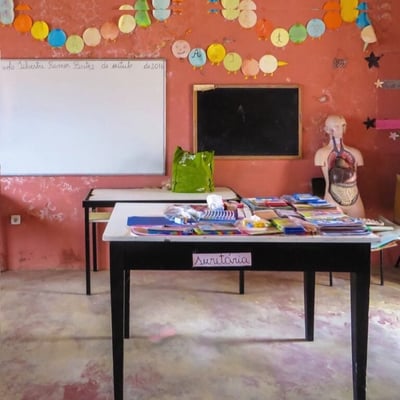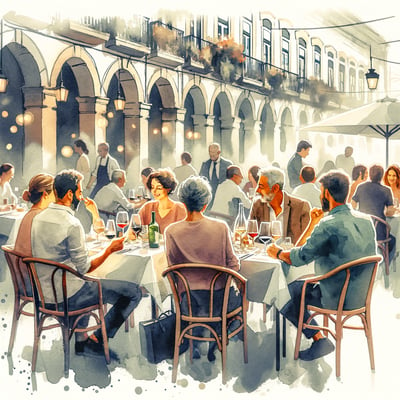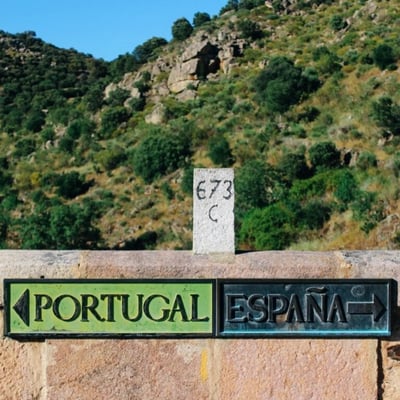1
00:00:03,116 –> 00:00:04,236
Ana: Boa tarde.
{{Ana: Good afternoon.}}
2
00:00:04,236 –> 00:00:06,076
Pode ajudar-me, por favor?
{{Can you help me, please?}}
3
00:00:06,076 –> 00:00:06,986
Empregado: Olá.
{{Employee: Hello.}}
4
00:00:06,986 –> 00:00:07,796
Diga…
{{Go ahead… (“Say”)}}
5
00:00:07,796 –> 00:00:10,636
Ana: Eu procuro um livro para a minha filha.
{{Ana: I’m looking for a book for my daughter.}}
6
00:00:10,636 –> 00:00:13,416
Quero incentivá-la a ler mais.
{{I want to encourage her to read more.}}
7
00:00:13,416 –> 00:00:17,756
Acho que ela vê muita televisão, faz-me muita confusão.
{{I think she watches too much TV, it boggles my mind.}}
8
00:00:17,756 –> 00:00:24,616
Empregado: Os miúdos, hoje em dia, passam a vida agarrados à televisão e aos telemóveis.
{{Employee: Kids these days spend their lives hooked to the TV and cell phones.}}
9
00:00:24,616 –> 00:00:27,296
Venha comigo até à secção infantil.
{{Come with me to the children’s section.}}
10
00:00:27,296 –> 00:00:29,036
Que idade tem a sua filha?
{{How old is your daughter?}}
11
00:00:29,036 –> 00:00:30,496
Ana: 13 anos.
{{Ana: 13 years [old].}}
12
00:00:30,496 –> 00:00:33,856
Empregado: Uff… O início da adolescência…
{{Employee: Oof… the beginning of adolescence…}}
13
00:00:33,856 –> 00:00:38,436
A idade do ‘eu quero, posso e mando’.
{{The age of ‘I want, I can, and I order’.}}
14
00:00:38,436 –> 00:00:40,196
Ana: Acham eles!
{{Ana: They think [so]!}}
15
00:00:40,196 –> 00:00:42,956
Empregado: Eu tenho um rapaz com essa idade também.
{{Employee: I have a boy that age too.}}
16
00:00:42,956 –> 00:00:44,996
Crescem tão depressa!
{{They grow up so fast!}}
17
00:00:44,996 –> 00:00:46,996
Ana: Não me diga nada…
{{Ana: No kidding…}}
18
00:00:46,996 –> 00:00:49,836
O tempo voa mesmo!
{{Time really flies!}}
19
00:00:49,836 –> 00:00:51,416
Empregado: É verdade!
{{Employee: It’s true!}}
20
00:00:51,416 –> 00:00:53,556
Então, deixe-me cá ver.
{{So, let me see here.}}
21
00:00:53,556 –> 00:00:57,556
Para uma menina dessa idade, eu aconselho este,
{{For a girl that age, I suggest this one,}}
22
00:00:57,556 –> 00:00:59,176
que é um clássico já.
{{which is now a classic.}}
23
00:00:59,176 –> 00:01:02,096
Ana: ‘Miúdas Apaixonadas’
{{Ana: ‘Girls in Love’.}}
24
00:01:02,096 –> 00:01:05,636
Empregado: É o primeiro, de uma coleção de três livros.
{{Employee: This is the first of a collection of three books.}}
25
00:01:05,636 –> 00:01:08,276
É antigo, mas é um clássico.
{{It’s old, but it’s a classic.}}
26
00:01:08,276 –> 00:01:10,436
Ana: Sabe como é a história?
{{Ana: Do you know the story?}}
27
00:01:10,436 –> 00:01:14,096
Empregado: Conta a história de três amigas adolescentes,
{{Employee: It tells the story of three teenage friends,}}
28
00:01:14,096 –> 00:01:19,316
e como elas lidam com a escola, a família, os primeiros amores…
{{and how they deal with school, family, first loves…}}
29
00:01:19,316 –> 00:01:22,996
Ana: Os dramas dos adolescentes… sei como é!
{{Ana: The dramas of teenagers… I know how it is!}}
30
00:01:22,996 –> 00:01:26,576
Empregado: Sim, mas também toca em temas mais profundos,
{{Employee: Yes, but it also touches on deeper themes,}}
31
00:01:26,576 –> 00:01:29,036
como a perda e o luto.
{{like loss and grief.}}
32
00:01:29,036 –> 00:01:31,936
É como lhe digo, é um livro antigo,
{{It’s like I tell you, it’s an old book,}}
33
00:01:31,936 –> 00:01:34,616
mas é um clássico e um ‘best seller’.
{{but it’s a classic and a best seller.}}
34
00:01:34,616 –> 00:01:36,496
Ana: Está bem, convenceu-me!
{{Ana: Okay, you convinced me!}}
35
00:01:36,496 –> 00:01:40,156
Vou levar-lhe este livro e, se ela gostar,
{{I’m taking this book to her, and if she likes it,}}
36
00:01:40,156 –> 00:01:42,336
venho buscar os outros dois.
{{I’ll come to pick up the other two.}}
37
00:01:42,336 –> 00:01:45,076
Empregado: É uma ótima escolha, acredite em mim.
{{Employee: It’s a great choice, believe me.}}
38
00:01:45,076 –> 00:01:47,016
Ela vai gostar muito.
{{She’ll love it.}}
39
00:01:47,016 –> 00:01:49,076
Ana: Obrigada pela ajuda.
{{Ana: Thanks for your help.}}
40
00:01:49,076 –> 00:01:51,576
Empregado: Posso ajudá-la em mais alguma coisa?
{{Employee: Can I help you with anything else?}}
41
00:01:51,576 –> 00:01:54,056
Ana: Não será necessário, obrigada.
{{Ana: That won’t be necessary, thank you.}}
42
00:01:54,056 –> 00:01:55,796
Quero levar um livro para mim,
{{I want to take a book for myself,}}
43
00:01:55,796 –> 00:01:57,956
mas eu dou uma vista de olhos.
{{but I’ll take a look around.}}
44
00:01:57,956 –> 00:01:59,456
Empregado: Tem a certeza?
{{Employee: Are you sure?}}
45
00:01:59,456 –> 00:02:00,336
Ana: Tenho, sim.
{{Ana: Yes, I am.}}
46
00:02:00,336 –> 00:02:02,496
Obrigada pela gentileza.
{{Thank you for your kindness.}}
47
00:02:02,496 –> 00:02:04,316
Empregado: Disponha sempre.
{{Employee: Anytime.}}
“`
 We respect your privacy and have a ZERO TOLERANCE for spam.
We respect your privacy and have a ZERO TOLERANCE for spam.
















Loved it simple and easy to follow
Paul Gueret
I love how you fold in common expressions such as “Disponha sempre,” “dou uma vista de olhos,” and “deixe-me cá ver” that are so useful but would be so difficult to know as newcomer to the language. Yet at the same time the dialogue is so easy to follow. You have really thought carefully about how you present your material!
Thanks Jay! So glad this is helpful for you. It’s always hard to find a good balance between adding more idiomatic phrases / keeping it simple, so we appreciate the feedback!
I really like the way you are presenting these shorties. Day to day conversations in common situations. Learning a foreign language starts with understanding what people talk about in various situations. These shorties offer a great help Here, in Alentejo, people speak very fast and it is very difficult to understand them but with daily practice it will improve….
Hi, I notice that in for example the word “ele” the e at the end is often left silent. But some of your actors pronounce it. Is that regional or simply optional? If regional, in which part of the country would that be more common please?
Olá, Stein! We may or may not drop the final E at will, mostly depending on how fast, articulated or emphatically we’re talking. It’s possible that there are clear regional patterns to this, but I don’t think so.
I definitely still struggle with these dialogs. I spent about three hours on this one, listening and repeating small clips at a time. I did fine in some sections but a lot was lost to me. I write down the phonetics of sequences when I can’t figure out the words being said and then compare my results with the real text when I’m done. My favorite was for “Miúdas Apaixonadas”. I wrote down “Miúdas a peix se nadas”. So close! 🙂
It’s great that you’re spending time challenging yourself with these, but don’t burn yourself out! Maybe try just working through a small section of each one and just listening to the rest of it freely. Then the next time you study, you could either move to a new one or come back to the same one and try a new section. You could try starting with the A1 Level Shorties to reduce the overwhelm a bit.
Maybe the Smart Review flash cards would be a good way to practice, too. You could read the English phrase, think about what the translation might be, and then flip the card with your eyes closed. Then it will play the audio of the translation and you can try to understand what’s being said.
Thanks foe the references, I’ll check these out. The site has a ton of content, which is good, but it’s not clear what the best approach is to tackle it in an orderly (progressive) manner. My approach so far has been to go through the Units in sequence to get a broad view of what’s in the language, with the plan to tackle the additional tools after I’ve completed the Units. I’ll want to go through the Units again though to help cement the knowledge.
Is there a practice module that says a phrase in Portuguese and then you get to write down what you’ve heard? It would give the English translation only after I’ve made my attempt to enter what I’ve heard in Portuguese.
Yes, but it’s part of the lessons, so it’s mixed in with the other question types. The “Listen and Type” questions work like this. You hear the audio only (or hear the audio from a video clip) and then type what you hear. Then you submit and it shows you the English translation.
Yes, I knew that about those if course. I was referring to a practice module like the flash cards, geared specifically for hearing comprehension. The ones that occur in the exercises are useful but they are always part of a fixed set of phrases that are being practiced. I can always tell immediately what is being said in these Listen and Type exercises. It would be very useful to have a Listen and Type practice module, dedicated solely to this purpose. Just random phrases being spoken that you have to write down, just like the Listen and Type exercises in the lessons, but with no hints of what is being said.
Yep, it’s a great idea! I’ll add your vote. 🙂
Muito obrigado!
A great source of material could be the many Shorties you have on this site, random lines like “Quero incentivá-la a ler mais” from the Shorty in this story. This would give a good variety of phrases taken from natural conversations spoken by a variety of people. It would be a useful tool.
Por favor,
what is the difference between buscar and procurar? Don’t them both mean “to search” ?
So, procurar means to search. In Brazilian Portuguese, buscar is a synonym, but in European Portuguese, it’s usually used in the sense of getting something or picking something/someone up. We don’t really use the verb buscar to talk about searching for things, even though we use the noun busca to describe a search/quest. Confusing!
Some examples:
– Vou procurar a Joana na escola -> I’m going to look for Joana at the school
– Vou buscar a Joana à escola -> I’m going to pick Joana up from school
Muito obrigado!
Really good thanks. Would be great to have the little + sign next to the expressions, so I could include selected expressions in my Smart Review
Yes, we’re working on adding this feature soon! 😉
Vou levar-lhe este livro e, se ela ‘gosta(r)’,
I’m taking this book to her, and if she likes it,
Why is the infinitive form of ‘gostar’ used here, as opposed to ‘gosta’?
Olá, Whit. This wouldn’t be the infinitive, but actually the future subjunctive. It’s the exact same form, so you can only distinguish between the two by looking at the grammatical context, so to speak (which is quite advanced!).
Hello!.. “Posso ajudá-la em mais alguma coisa?”. Here, why do you not use the infinitive “ajudar” after posso ? Simililary, in the sentence “Quero incentivá-la a ler mais” would it be possible to use the infinitive “incentivar” ?
Olá! Actually, we are already using the infinitive in both cases. But since we’re also using direct object pronouns, we have to make some structural adaptations – whenever a verb form ends in a consonant, that consonant is dropped and the direct object pronoun has to begin with an L. Finally, in case of using an infinitive, an accent is added to clearly indicate where the stress is:
– Ajudar (infinitive) + a (3rd-person direct object pronoun) -> [Ajudar-a] -> Ajudá-la
– Incentivar (infinitive) + a (3rd-person direct object pronoun) -> [Incentivar-a] -> Incentivá-la
Both sentences would also be grammatically correct if we used the infinitive by itself without any object pronouns. However, adding the object pronouns adds clarity of meaning.
Muito obrigado.. These object pronouns is an advanced topic for me, hence my confusion.. Now it is clear.. Thanks..
I wonder why you would say „Quero voar até Portugal“ – I would have used „Quero voar para Portugal“
Can you give me some clarity?
Thank you!
It’s just a choice of wording! It’s OK to say it like that. It’s like saying “I want to fly over to Portugal” instead of “I want to fly to Portugal”. “Quero voar para Portugal” would be the easiest, most intuitive and common form, though.
I’d dare to say that if someone used “até” I’d expect them to complete the sentence with the purpose of the trip. Like if the “até” was a way of starting to say that they wanted to “fly over to Portugal, in order to…”. This is not a rule, though! It’s just a feeling of a native Portuguese speaker. 🙂
Many thanks, Relógio!